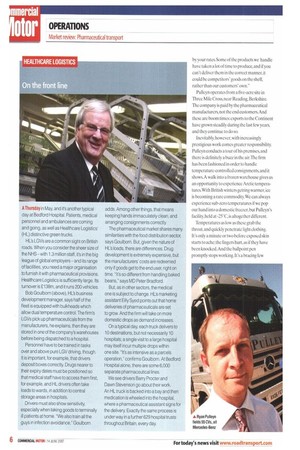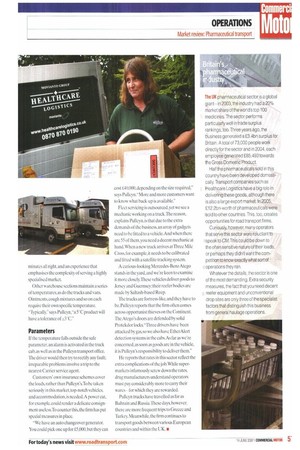HEALTHCARE LOGISTICS
Page 56

Page 57

If you've noticed an error in this article please click here to report it so we can fix it.
A Thursday in May, and it's another typical day at Bedford Hospital. Patients, medical personnel and ambulances are coming and going, as well as Healthcare Logistics' (HL) distinctive green trucks.
HL's LGVs are a common sight on British roads. When you consider the sheer size of the NHS with 1.3 million staff, it's in the big league of global employers and its range of facilities, you need a major organisation to furnish it with pharmaceutical provisions. Healthcare Logistics is sufficiently large. Its turnover is £138m, and it runs 200 vehicles.
Bob Goulborn (above), HLS business development manager, says half of the fleet is equipped with bulkheads which allow dual temperature control. The firm's LGVs pick up pharmaceuticals from the manufacturers, he explains, then they are stored in one of the company's warehouses before being dispatched to a hospital.
Personnel have to be trained in tasks over and above pure LGV driving, though. It is important, for example, that drivers deposit boxes correctly. Drugs nearer to their expiry dates must be positioned so that medical staff have to access them first, for example, and HL drivers often take loads to wards, in addition to central storage areas in hospitals.
Drivers must also show sensitivity, especially when taking goods to terminally ill patients at home. "We also train all the guys in infection avoidance,' Goulborn adds. Among other things, that means keeping hands immaculately clean, and arranging consignments correctly.
The pharmaceutical market shares many similarities with the food distribution sector, says Goulborn. But, given the nature of HL's loads, there are differences. Drug development is extremely expensive, but the manufacturers' costs are redeemed only if goods get to the end user, right on time. "It's so different from handling baked beans," says MD Peter Bradford.
But, as in other sectors, the medical one is subject to change. HL's marketing assistant Filly Syed points out that home deliveries of pharmaceuticals are set to grow. And the firm will take on more domestic drops as demand increases.
On a typical day, each truck delivers to 10 destinations, but not necessarily 10 hospitals; a single visit to a large hospital may itself incur multiple drops within one site. "It's as intensive as a parcels operation," confirms Goulborn. At Bedford Hospital alone, there are some 6,000 separate pharmaceutical lines.
We see drivers Barry Procter and Dawn Stevenson go about their work. An HL truck is backed into a bay and then medication is wheeled into the hospital, where a pharmaceutical assistant signs for the delivery. Exactly the same process is under way in a further 629 hospital trusts throughout Britain, every day. by your rates. Some of the products we handle have taken a lot of time to produce,and if you can't deliver them in the correct manner, it could be competitors' goods on the shelf, rather than our customers' own."
Pulleyn operates from a five-acre site in Three Mile Cross, near Reading,Berkshire. The company is paid by the pharmaceutical manufacturers, not the end customers. And these are boom times: exports to the Continent have gown steadily during the last few years, and they continue to do so.
Inevitably, however, with increasingly prestigious work comes greater responsibility. Pulleyn conducts a tour of his premises, and there is definitely a buzz in the air.The firm has been fashioned in order to handle temperature-controlled consignments, and it shows.A walk into a frozen warehouse gives us an opportunity to experience Arctic temperatures.With British winters getting warmer, ice is becoming a rare commodity. We can always experience sub-zero temperatures if we pop our hand into a domestic freezer, hut Pulleyn's facility, held at -25'C, is altogether different.
Temperatures as low as these grab the throat, and quickly penetrate light clothing. It's only a minute or two before exposed skin starts to ache: the fingers hurt, as if they have been knocked.And the ballpoint pen promptly stops working. It's a bracing few minutes all right, and an experience that emphasises the complexity of serving a highly specialised market.
Other warehouse sections maintain a series of temperatures, as do the trucks and vans. Ointments, cough mixtures and so on each require their own specific temperature. "Typically" says Pulleyn. 'a 5"C product will have a tolerance of ±3'C."
Parameters
the temperature falls outside the safe parameter, an alarm is activated in the truck cab. as well as in the Pulleyn transport office. The driver would then try to rectify any fault; irreparable problems involve a trip to the nearest Carrier service agent.
Customers' own insurance schemes cover the loads, rather than Pulleyn's.To be taken seriously in this market, top-notch vehicles, and accommodation, is needed. A power cut, for example, could render a delicate consignment useless.To counter this, the firm has put special measures in place.
"We have an auto changeover generator. You could pick one up for £5,000, but they can cost £40,000, depending on the size required," says Pulleyn. "More and more customers want to know what back-up is available."
Fleet servicing is outsourced, yet we see a mechanic working on a truck.The reason, explains Pulleyn, is that due to the extra demands of the business, an array of gadgets need to be fitted to a vehicle.And when there are 55 of them, you need a decent mechanic at hand. When a new truck arrives at Three Mile Cross. for example, it needs to be calibrated and fitted with a satellite tracking system.
A curious-looking Mercedes-Benz Atego stands in the yard, and we're keen to examine it more closely.These vehicles deliver goods to Jersey and Guernsey; their reefer bodies are made by Saltash-based Reep.
The trucks are fortress-like, and they have to be. Pulleyn reports that the firm often comes across opportunist thieves on the Continent. The At ego's doors are defended by solid Protekdor locks. "Three drivers have been attacked by gas, so we also have EtherAlert detection systems in the cabs. As far as we're concerned, as soon as goods are in the vehicle, it is Pulleyn's responsibility to deliver them."
He reports that rates in this sector reflect the extra complications of the job.While supermarkets infamously screw down the rates. drug manufacturers understand operators must pay considerably more to carry their wares for which they are rewarded.
Pulleyn trucks have travelled as far as Bahrain and Russia.These days, however. there are more frequent trips to Greece and Turkey. Meanwhile.the firm continues to transport goods between various European countries and within the UK. •


























































































































































































